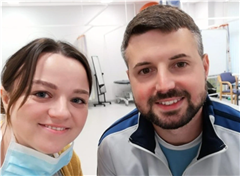WHEN Ben Wilson started having pounding headaches, he blamed it on his busy lifestyle.
Never did the 36-year-old imagine that he in fact had a potentially deadly growth in his brain – which may have been there for a decade.
Ben, from Ackworth, West Yorkshire, was working as a full time manager of 10 pubs when his symptoms started in January 2020.
He thought they might go away if he got more sleep and drank more water.
It was only when he was furloughed because of Covid three months later, and his life slowed right down, that he took notice of his symptoms.
He continued to have headaches and also dizziness, so called his GP.
Ben, who lives with his partner, an NHS worker, said: “I’ve always tried to just look after myself rather than running to the doctor or thinking the worst.
"So, before lockdown, I’d just drunk more water and tried to get more sleep to deal with the headaches.
“But when I was furloughed, I didn’t have to work anymore or make long journeys but the headaches – a pounding sensation across my head that seemed to last all day long – were still there.
"I realised then that it couldn’t be my busy life.”
Most read in Health
HEATWAVE I’m a doc these are the unusual signs of dehydration – including sugar cravings
My baby's rare condition means we can't brush her hair & she looks like Boris
I felt a pain in my chest working out – doctors have given me 3 years to live
I'm a PT – this is what you must know if you only exercise on the weekend
After suffering a whole month of headaches while furloughed, Ben was finally spurred into taking action at the start of May 2020.
He explained: “I was in the garden pottering around when I realised I had to do something.
“I had this pounding and dizziness in my head when I tipped my head back, like if I was looking at the sky or drinking from a bottle or can.
“I searched online and assumed it was vertigo. Definitely not a brain tumour.”
Ben was given a telephone appointment soon after, on a Tuesday morning.
But the doctor was so concerned by his symptoms he was asked to come in urgently for a face-to-face appointment.
Ben said: “That was my first indication that something was seriously wrong, as obviously at the height of Covid, they weren’t in a rush to have people in the surgery.”
He attended the appointment later that same morning and was asked one crucial question by the doctor – whether his headaches were the worst he had ever experienced.
When Ben said yes, he was told to head straight to Pinderfields General Hospital in Wakefield, where he was given a CT scan.
Ben said: “When I was called back in, the lady explained they’d found a very large growth on my brain.
“That was a Tuesday and I didn’t go home for two weeks.”
Though doctors could not initially say what type of tumour Ben had, it was later diagnosed as a slow growing benign tumour called a pilocytic astrocytoma.
It was suggested the tumour, which contained both solid and liquid matter, may have been growing for up to 10 years.
The tumour is located on Ben’s cerebellum – an area at the back of the brain that plays an important role in movement, coordination and balance.
Due to pressure on the brain, the symptoms include headaches – that are worse in the morning – nauseea, vomiting and a change in mood or personality.
Ben said: "It was all just such a huge shock. I don't feel I really had time to take it in."
On 12 May, exactly a week after he had first seen his GP and after being transferred to Leeds General Infirmary, Ben underwent an eight-hour surgery under general anaesthetic to remove the tumour.
When he woke up in intensive care, he had a dedicated member of staff by his bedside night and day for 24 hours.
Ben said: "I felt horrendous. The scarring was on the dead centre back of my head so lying down was quite difficult.
"I was very uncomfortable. I was in a lot of pain."
Incredibly, Ben was discharged exactly a week on and rested at home for six weeks.
Ben said: “It was such a whirlwind from ringing the doctors to two weeks later you’re home with a scar and needing aids to get in the bath.
"At the peak of my recovery, for weeks following the operation, I was taking 27 tablets a day."
But Ben recovered quickly, and within six months, he was able to drive and return to work.
Ben said: “I feel really lucky my tumour wasn’t cancerous and to have recovered so well.
“I feel generally fine now and just have some lingering dizziness now and again.
"I can't say what would have happened if I hadn't got it checked out when I did, but it wouldn't have been good. I imagine my headaches would have only got worse."
Thankful to have his health back, Ben is now supporting The Brain Tumour Charity in their new campaign – Better Safe Than Tumour.
It aims to highlight the symptoms of brain tumours in both children and adults.
Dr David Jenkinson, Chief Scientific Officer at The Brain Tumour Charity, said: “The symptoms of the disease do vary from person to person.
“But the most common symptoms amongst adults include headaches, changes to vision, seizures, dizziness, memory problems, nausea and fatigue.
Read More on The Sun
Man baffled after he’s told not to talk to his own child on a flight
My boobs stole the show at my son’s party, trolls say my dress was indecent
"We’d encourage anyone who is worried about a symptom that’s unusual for them, or if anyone experiences a persistent combination of these symptoms, to see their GP to help rule a brain tumour out.
"With over 10,000 people diagnosed with a brain tumour in England every year, it is absolutely vital that we support more people to know what to look out for and to get anything concerning checked out by their GP.”
The symptoms of a brain tumour in adults
If you have one of these symptoms alone, it's unlikely to be a brain tumour.
If symptoms persist for more than two weeks, you should speak to a doctor as soon as possible, the Brain Tumour Charity says.
If symptoms develop quickly or are severe, call 999 or go to the emergency department.
Symptoms
- Persistent/recurent headaches
- Fatigue
- Seizures or fits
- Nausea/vomiting
- Memory problems
- Problems with vision
- Cognitive changes
- Speech difficulties
- Loss of taste and smell
- Balance problems
- Numbness or tingling
Source: Read Full Article













